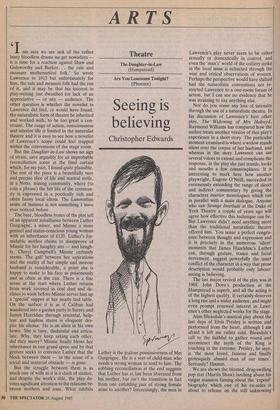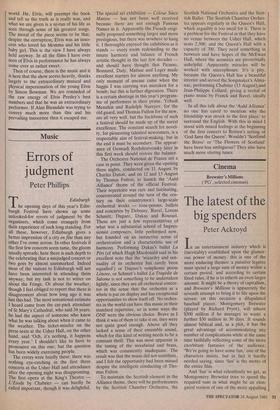ARTS
Theatre
The Daughter-in-Law (Hampstead) Are You Lonesome Tonight? (Phoenix)
Seeing is believing
Christopher Edwards
Iam sure we are sick of the rather bony bloodless drama we get nowadays — it is time for a reaction against Shaw and Galsworthy and Barker. . . the rule and measure mathematical folk.' So wrote Lawrence in 1913 but unfortunately for him, the rule and measure folk had the run of it, and it may be that his interest in play-writing just dwindled for lack of an appreciative — or any — audience. The other question is whether the novelist in Lawrence did find, or would have found, the naturalistic form of theatre he inherited and worked with, to be too great a con- straint. The range of action, consciousness and interior life is limited in the naturalist theatre and it is easy to see how a novelist of Lawrence's scope could feel trapped within the conventions of the stage room But the Daughter-in-Law shows no sign of strain, save arguably for an improbable reconciliation scene at the final curtain which, for my part, I found quite plausible. The rest of the piece is a beautifully sure and precise slice of life and marital strife, in a Notts. mining community, where (to coin a phrase) the felt life of the commun- ity is expressed in a poetically rich and often funny local idiom. The Lawrentian sense of humour is not something I have ever noticed before.
The bare, bloodless bones of the plot tell of an apparent misalliance between Luther Gasgoigne, a miner, and Minnie a more genteel and status-conscious young woman with an inheritance of £120. Luther's for- midable mother claims to disapprove of Minnie for her haughty airs — and haugh- ty, Cheryl Campbell's Minnie certainly seems. The gulf between her aspirations and the reality of her simple and morose husband is considerable, a point she is happy to make to his face as poisonously and as often as she can. There is a fine scene at the start where Luther returns from work covered in coal dust and de- clines to wash before Minnie serves him up a 'special' supper at her neatly laid table. On the surface it is as if Caliban had wandered into a garden party in Surrey and James Haze!dine through resentful, help- less and hapless stares is eloquent des- pite his silence. He is an alien in his own home. She is busy, disdainful and articu- late. Why, they keep asking each other, did they marry? Minnie finally blows her inheritance in one grand spree and by that gesture seeks to convince Luther that the block between them — in the sense of a social and material obstacle — is gone.
But the struggle between them is as much one of wills as it is a clash of station, and despite the work's title, the play de- votes significant attention to the relations be- tween mothers and sons. What inhibits Luther is the jealous possessiveness of Mrs Gasgoigne. He is a sort of child-man who needs a strong woman to tend to him. The sobbing reconciliation at the end suggests that Luther has at last been liberated from his mother, but isn't the transition in fact from one enfolding pair of strong female arms to another? Interestingly, the men in Lawrence's play never seem to be either sexually or domestically in control, and even the 'man's' world of the colliery strike in the local mine is refracted through the wise and critical observations of women. Perhaps the perspective would have shifted had the naturalistic conventions not re- stricted Lawrence to a one-room forum of action, but I can see no evidence that he was straining to say anything else.
Nor do you sense any loss of intensity through the use of a naturalistic theatre. In his discussion of Lawrence's best other play, The Widowing of Mrs Holroyd, Raymond Williams has compared how the author treats another version of that play's experience in a short story. The particular moment examined is where a widow stands silent over the corpse of her husband, and whereas in the story Lawrence can use several voices to extend and complicate the response, in the play she just stands, looks and mouths a few commonplaces. It is interesting to mark here how another playwright, Eugene O'Neill, succeeded in enormously extending the range of direct and indirect commentary by giving the characters interior monologues which ran in parallel with a main dialogue, Anyone who saw Strange Interlude at the Duke of York Theatre a couple of years ago will agree how effective this technique can be. But Lawrence didn't need anything inore than the traditional naturalistic theatre offered him. You sense a perfect congru- ence between thought and expression and it is precisely in the numerous 'silent' moments that James Hazeldine's Luther can, through gesture, stance and facial movement, suggest powerfully the inner conflict of the character in a way that prose description would probably only labour: seeing is believing.
The last major revival of the play was in 1968. John Dove's production at the Hampstead is superb, and all the acting is of the highest quality. It certainly deserves a long run and a wider audience, and might even prompt renewed interest in Lawr- ence's other neglected works for the stage.
Alan Bleasdale's musical play about the last days of Elvis Presley is written and performed from the heart, although I am afraid it left me rather cold. Bleasdale's call to the faithful to gather round and reconstruct the myth of the King is touching in the extreme. Presley, he says, is 'the most loved, famous and finally grotesquely abused man of our times'. Seriously? Hmmm.
We are shown the bloated, drug-swilling pop star (Martin Shaw) lurching about his vulgar mansion fuming about the 'exposé' biography which one of his ex-aides is about to release on the still unknowing world. He, Elvis, will preempt the book and tell us the truth as it really was, and what we are given is a re-run of his life as seen through some of his greatest songs. The moral of the piece seems to be that, despite the corruption, Elvis was an inno- cent who loved his Momma and his little baby girl. This is the view I have always held anyway. In all the films I have ever seen of Elvis in performance he has always come over as rather sweet.
Then of course, there is the music and it is here that the show scores heavily, thanks largely to the extraordinary musical and physical impersonation of the young Elvis by Simon Bowman. We are reminded of the raw energy of Elvis Presley's best numbers and that he was an extraordinary performer. If Alan Bleasdale was trying to convey much more than this and his prevailing innocence then it escaped me.











































 Previous page
Previous page